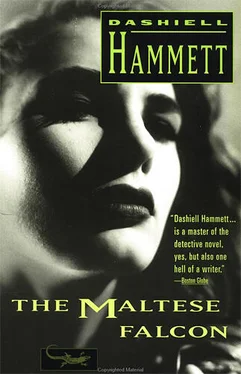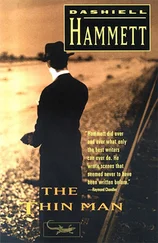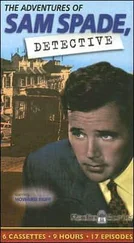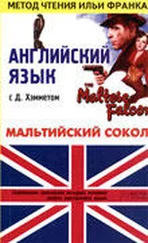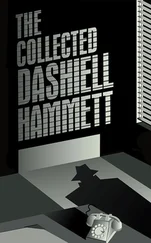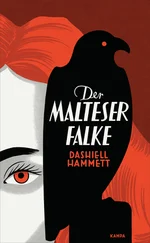Spade lighted his cigarette and laughed his mouth empty of smoke. "Want me to phone him and ask him to come back?"
She shook her head, not smiling. Her eyes moved back and forth between her lids as she shook her head, maintaining their focus on Spade's eyes. Her eyes were inquisitive.
Spade put an arm across her back, cupping his hand over the smooth bare white shoulder farthest from him. She leaned back into the bend of his arm. He said: "Well, I'm listening."
She twisted her head around to smile up at him with playful insolence, asking: "Do you need your arm there for that?"
"No." He removed his hand from her shoulder and let his arm drop down behind her.
"You're altogether unpredictable," she murmured.
He nodded and said annably: "I'm still listening."
"Look at the time!" she exclaimed, wriggling a finger at the alarm-clock perched atop the book saying two-fifty with its clumsily shaped hands.
"Uh-huh, it's been a busy evening."
"I must go." She rose from the sofa. "This is terrible."
Spade did not rise. He shook his head and said: "Not until you've told me about it."
"But look at the time," she protested, "and it would take hours to tell you."
"It'll have to take them then."
"Am I a prisoner?" she asked gaily.
"Besides, there's the kid outside. Maybe he hasn't gone home to sleep yet."
Her gaiety vanished. "Do you think he's still there?"
"It's likely."
She shivered. "Could you find out?"
"I could go down and see."
"Oh, that's—will you?"
Spade studied her anxious face for a moment and then got up from the sofa saying: "Sure." He got a hat and overcoat from the closet. "I'll be gone about ten minutes."
"Do be careful," she begged as she followed him to the corridor-door.
He said, "I will," and went out.
Post Street was empty when Spade issued into it. He walked east a block, crossed the street, walked west two blocks on the other side, recrossed it, and returned to his building without having seen anyone except two mechanics working on a car in a garage.
When he opened his apartment-door Brigid O'Shaughriessy was standing at the bend in the passageway, holding Cairo's pistol straight down at her side.
"He's still there," Spade said.
She bit the inside of her lip and turned slowly, going back into the living-room. Spade followed her in, put his hat and overcoat on a chair, said, "So we'll have time to talk," and went into the kitchen.
He had put the coffee-pot on the stove when she came to the door, and was slicing a slender loaf of French bread. She stood in the doorway and watched him with preoccupied ees. The fingers of her left hand idly caressed the body and barrel of the pistol her right hand still held.
"The table-cloth's in there," he said, pointing the bread-knife at a cupboard that was one breakfast-nook partition.
She set the table while he spread liverwurst on, or put cold corned beef between, the small ovals of bread he had sliced. Then he poured the coffee, added brandy to it from a squat bottle, and they sat at the table. They sat side by side on one of the benches. She put the pistol down on the end of the bench nearer her.
"You can start now, between bites," he said.
She made a face at him, complained, "You're the most insistent person," and bit a sandwich.
"Yes, and wild and unpredictable. What's this bird, this falcon, that everybody's all steamed up about?"
She chewed the beef and bread in her mouth, swallowed it, looked attentively at the small crescent its removal had made in the sandwich's rim, and asked: "Suppose I wouhdn't tell you? Suppose I wouldn't tell you anything at all about it? What would you do?"
"You mean about the bird?"
"I mean about the whole thing."
"I wouldn't be too surprised," he told her, grinning so that the edges of his jaw-teeth were visible, "to know what to do next."
"And that would be?" She transferred her attention from the sandwich to his face. "That's what I wanted to know: what would you do next?"
He shook his head.
Mockery rippled in a smile on her face. "Something wild and unpredictable?"
"Maybe. But I don't see what you've got to gain by covering up now. It's coining out bit by bit anyhow. There's a lot of it I don't know, but there's some of it I do, and some more that I can guess at, and, give me another day like this, I'll soon be knowing things about it that you don't know."
"I suppose you do now," she said, hooking at her sandwich again, her face serious. "But—oh!—I'm so tired of it, and I do so hate having to talk about it. Wouldn't it—wouldn't it be just as well to wait and let you learn about it as you say you will?"
Spade laughed. "I don't know. You'll have to figure that out for yourself. My way of learning is to heave a wild and unpredictable monkeywrench into the machinery. It's all right with me, if you're sure none of the flying pieces will hurt you."
She moved her bare shoulders uneasily, but said nothing. For several minutes they ate in silence, he phlegmatically, she thoughtfully. Then she said in a hushed voice: "I'm afraid of you, and that's the truth."
He said: "That's not the truth."
"It is," she insisted in the same low voice. "I know two men I'm afraid of and I've seen both of them tonight."
"I can understand your being afraid of Cairo," Spade said. "He's out of your reach."
"And you aren't?"
"Not that way," he said and grinned.
She blushed. She picked up a slice of bread encrusted with grey liverwurst. She put it down on her plate. She wrinkled her white forehead and she said: "It's a black figure, as you know, smooth and shiny, of a bird, a hawk or falcon, about that high." She held her hands a foot apart.
"What makes it important?"
She sipped coffee and brandy before she shook her head. "I don't know." she said. "They'd never tell nie. They promised me five hundred pounds if I helped them get it. Then Floyd said afterward, after we'd left Joe, that he'd give me seven hundred and fifty."
"So it must be worth more than seventy-five hundred dollars?"
"Oh, much more than that," she said. "They didn't pretend that they were sharing equally with me. They were simply hiring nie to help them."
"To help them how?"
She lifted her cup to her lips again. Spade, not moving the domineering stare of his yellow-grey eyes from her face, began to make a cigarette. Behind them the percolator bubbled on the stove.
"To help them get it from the man who had it," she said slowly when she had lowered her cup, "a Russian named ICemidov."
"How?"
"Oh, but that's not important," she objected, "and wouldn't help you"—she smiled impudenthy—"and is certainly none of your business."
"This was in Constantinople?"
She hesitated, nodded, and said: "Marmora."
He waved his cigarette at her, saying: "Co ahead, w'hat happened then?"
"But that's all. I've told you. They promised me five hundred pounds to help them and I did and then we found that Joe Cairo meant to desert us, taking the falcon with him and leaving us nothing. So we did exactly that to him, first. But then I wasn't any better off than I had been before, because Floyd hadn't any intention at all of paying me the seven hundred and fifty pounds he had promised me. I had learned that by the tinie w'e got here. He said we would go to New York, where he would sell it and give me my share, but I could see he wasn't telling nie the truth." Indignation had darkened her eyes to violet. "And that's why I canie to you to get you to help me learn where the falcon was."
"And suppose you'd got it? What then?"
"Then I'd have been in a position to talk terms with Mr. Floyd Thursby."
Spade squinted at her and suggested: "But you wouldn't have known where to take it to get more money than he'd give you, the larger suni that you knew he expected to sell it for?"
Читать дальше
